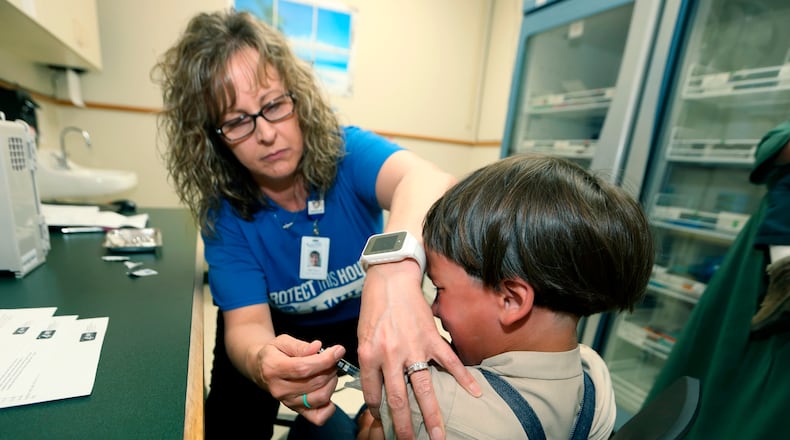The MMR vaccine, which became widely available to the public in 1963, is an attenuated, or weakened, live virus vaccine, according to the Centers for Disease Control. This means that after injection, the viruses cause a harmless infection in the vaccinated person with few, if any, symptoms before they are eliminated from the body. The person’s immune system fights the infection caused by these weakened viruses, and immunity develops.
While the MMR vaccine has been available for decades, the investigations into why families involved in the current measles outbreak did not vaccinate their children eligible for the vaccine revealed it was due to their concerns for autism, according to Columbus Health Commissioner Dr. Mysheika Roberts. None of the parents interviewed mentioned access to a vaccine provider as a reason why an eligible child was not vaccinated, Roberts said.
“It really was an intentional decision not to get their child vaccinated,” Roberts said.
Unethical, fraudulent study
The controversy around the MMR vaccine came in 1998 following a paper written by Andrew Wakefield and 12 of his colleagues publishing a case series in the medical journal The Lancet suggesting the MMR vaccine may predispose to behavioral regression and pervasive developmental disorder in children.
The paper was later retracted, Wakefield and his colleagues were found to have committed ethical violations, and the British Medical Journal published a series of articles alleging fraud behind Wakefield’s paper, which appeared to have taken place for financial gain. Wakefield was funded by lawyers who were engaged by parents in lawsuits against vaccine-producing companies, according to the National Library of Medicine.
Other ethical violations committed by Wakefield and his colleagues included that they did not get the necessary ethical clearances to conduct their investigations with the children involved, and they also misrepresented the science in his paper. The Indian Journal of Psychiatry also noted the small sample size of only 12 children involved in the research, as well as " the uncontrolled design” and “the speculative nature of the conclusions.”
Studies refute link to autism
Subsequent studies have shown there is no link between vaccines and autism spectrum disorder, including a 2013 study in the Journal of Pediatrics. This study involved 256 children with autism spectrum disorder and 752 control children. The study found that increasing exposure to antibody-stimulating proteins and polysaccharides in vaccines during the first two years of life was not related to the risk of developing an autism spectrum disorder.
Guerrero-Duby said one of the definitive studies involving vaccines and autism was one done in 1999 by the researcher Brent Taylor and his colleagues, also published in The Lancet. This epidemiological study sought to see if there was a causal association between the MMR vaccine and autism by studying children with autism born since 1979 as the MMR vaccine was not introduced in the UK until 1988. The study found no sudden “step-up” or change in the percentage of autism cases after the introduction of MMR vaccination.
There was also a Danish study published in the New England Journal of Medicine that was a retrospective cohort study of all children born in Denmark from January 1991 through December 1998. The study found the occurrence of autism was the same in both unvaccinated children and vaccinated children.
“Over 20 years, the definitive study proving that there was no connection to autism has been out there, and people still want to cling to misinformation, because they’re afraid, and we try to dispel their fear, but we do know people are afraid,” Guerrero-Duby said.
Misinformation spreads particularly aggressively online because of how social media platforms prioritize things that get engagement, regardless of whether they’re true, she said.
Vaccines effective
Guerrero-Duby said there is good information available, including at the Children’s Hospital of Philadelphia’s vaccine education center and the American Academy of Pediatrics websites.
Families can also talk to a trusted health care provider or their child’s pediatrician, Guerrero-Duby said.
The CDC recommends children get two doses of the MMR vaccine starting when the child is 12 months to 15 months, followed by a second dose when the child is between four and six years.
Guerrero-Duby said the MMR vaccine is safe and also one of the most effective vaccines available. One dose of MMR vaccine is 93% effective against measles, 78% effective against mumps, and 97% effective against rubella, according to the CDC. Two doses of MMR vaccine are 97% effective against measles and 88% effective against mumps.
The current measles outbreak in central Ohio, including a case involving an infant in Clark County, has 81 cases, as of Thursday, including 29 children who have been hospitalized. The cases include 76 unvaccinated children, 22 children under the age of one year who are too young to be vaccinated, three children who have received one dose of the MMR vaccine, and two children with an unknown vaccination status. There have been no fully vaccinated children who have caught the measles in this outbreak.
How to get your child vaccinated
The U.S. Centers for Disease Control provides resources on its website about how families can access vaccines for their children at no cost to them at www.cdc.gov/vaccines/programs/vfc/. The Vaccines for Children Program offers vaccines at no cost for eligible children through doctors enrolled in the program.
Below are the contact phone numbers for each county health department in the Dayton region:
- Public Health - Dayton and Montgomery County: (937) 225-5700
- Clark County Combined Health District: (937) 390-5600
- Butler County General Health District: (513) 863-1770
- Warren County Health District: (513) 695-1228
- Preble County Public Health: (937) 472-0087
- Miami County Public Health: (937) 573-3500 or call (937) 573-3518 to schedule an immunization
- Darke County Health District: (937) 548-4196
- Champaign Health District: (937) 484-1605
About the Author

